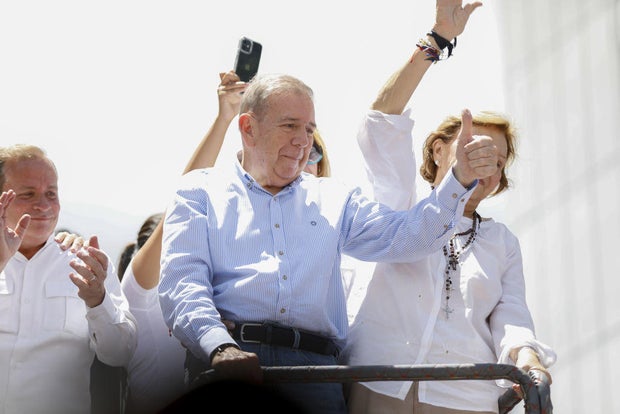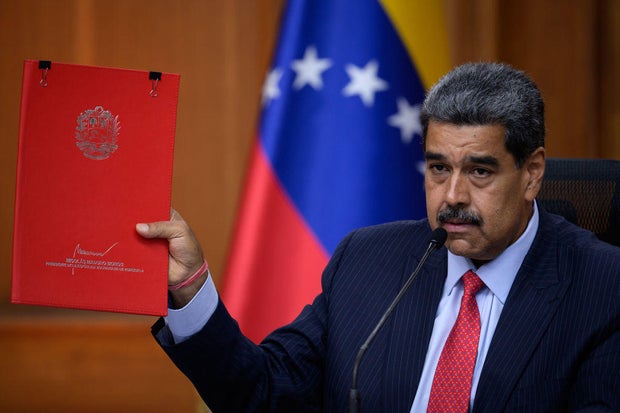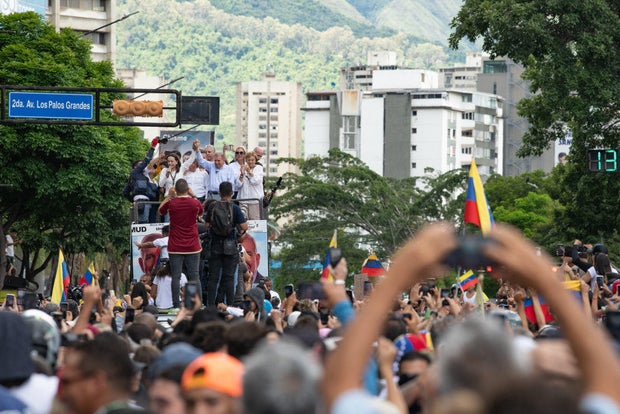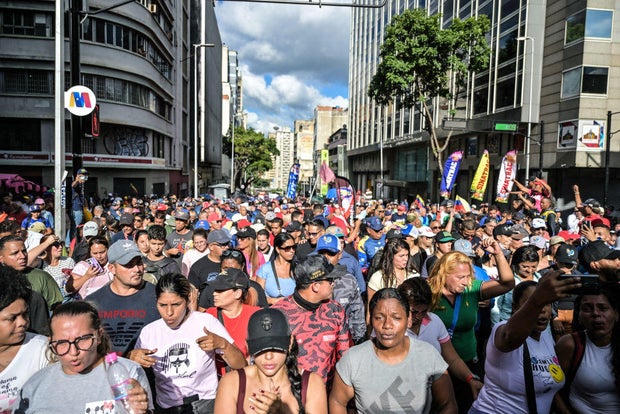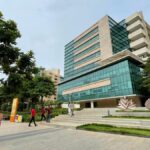The US government on Thursday recognized Venezuelan opposition candidate Edmundo González as the winner South American presidential electionundermined the results announced by the electoral authorities declaring President Nicolás Maduro the winner.
“Due to overwhelming evidence, it is clear to the United States and, most importantly, to the Venezuelan people, that Edmundo González Urrutia won the majority of votes in the July 28 presidential election,” US Secretary of State Antony Blinken said in a statement.
The National Electoral Council declared Maduro the most anticipated winner of Sunday’s election, but the president’s main challenger, González, and opposition leader Maria Corina Machado said they had obtained more than two-thirds of the tally sheets printed by each electronic voting machine after the polls closed. . .
Pedro Rances Mattey/Anadolu via Getty Images
He said the release of data on the number would prove Maduro lost.
The announcement from the US government comes amid diplomatic efforts to persuade Maduro to release the vote count from the election and increasing calls for an independent review of the results, according to officials from Brazil and México.
Government officials from Brazil, Colombia and Mexico have been in constant communication with the Maduro government to convince them that they should share the vote count sheets from Sunday’s election and allow for impartial verification, Brazilian government officials told The Associated Press on Thursday.
The official told the Venezuelan government that sharing the data was the only way to dispel doubts about the results, said the Brazilian official, who spoke on condition of anonymity because he was not authorized to speak about the diplomatic effort.
A Mexican official, who also spoke on condition of anonymity for the same reason, confirmed that the three governments had discussed the issue with Venezuela but did not provide details. Earlier, Mexican President Andrés Manuel López Obrador said he would speak with Brazilian President Luiz Inácio Lula da Silva and Colombian President Gustavo Petro, and his government is confident of the importance of the general election count.
Later on Thursday, the governments of Brazil, Colombia and Mexico issued a joint statement calling on Venezuela’s electoral authorities “to move forward quickly and release” detailed voting data, but did not confirm background diplomatic efforts to persuade Maduro’s government to release the vote. tallies.
“The basic principle of popular sovereignty must be respected through the verification of impartial results,” he said in the statement.
Gaby Oraa/Bloomberg via Getty Images
On Monday, after the National Electoral Council declared Maduro the winner of the election, thousands of opposition supporters took to the streets. The government said that hundreds of protesters were arrested and the Venezuela-based human rights organization Foro Penal said 11 people were killed. Dozens more were arrested the next day, including former opposition candidate Freddy Superlano.
Opposition leader Machado – who is banned from running for president – and González addressed a rally of supporters in the capital, Caracas, on Tuesday, but have not been seen in public since. Later that day, the president of the National Assembly, Jorge Rodriguez, called for their arrest, calling them criminals and fascists.
In an op-ed published Thursday in the Wall Street Journal, Machado said he was “in hiding, fearing for my life, my freedom, and my friends.” He reiterated that the opposition has physical evidence that Maduro lost the election and called on the international community to intervene.
“We have voted Mr. Maduro out,” he wrote. “It is now up to the international community to decide whether to allow an illegitimate government.”
Image by Alfredo Lasry R/Getty
Government repression over the years has led to the exile of opposition leaders. After the op-ed was published, Machado’s team told the AP that they were “protecting it.” Machado later posted a video on social media urging supporters to gather Saturday morning across the country.
González’s campaign had no comment on the op-ed.
On Wednesday, Maduro asked Venezuela’s highest court to conduct an audit of the election, but the request was almost immediately met with criticism from foreign observers who said the court was too close to the government to produce an independent review.
It is unclear if Maduro’s first concession to demand more transparency was the result of discussions with Brazil, Colombia and Mexico. The Venezuelan president confirmed during a press conference on Wednesday that he had spoken to Petro about this.
Venezuela’s Supreme Court of Justice is close to Maduro’s government. The court’s judges were proposed by federal officials and ratified by the National Assembly, which is dominated by Maduro sympathizers.
On Thursday, the court accepted Maduro’s request for an audit and ordered him, González and eight other candidates participating in the presidential election to appear before a judge on Friday.
JUAN BARRETO/AFP via Getty Images
González and Machado said they got more than two-thirds of the tally sheets printed from electronic voting machines after the polls closed. He said the release of data on the number would prove Maduro lost.
Asked why electoral authorities did not release detailed vote counts, Maduro said the National Electoral Council had been attacked, including a cyber attack, without elaborating.
The presidents of Colombia and Brazil – two close allies of the Venezuelan government – have asked Maduro to release the detailed vote count.
Brazilian officials said the diplomatic effort was only intended to promote dialogue among Venezuelan stakeholders to negotiate a solution to the disputed election. The official said this would include the release of voting data and allow independent verification.
López Obrador said that Mexico expects the wishes of the Venezuelan people to be respected and that there will be no violence. He added that Mexico expects “the evidence, the record of the election results, to be presented.”
Pressure has been building on the president since the election.
The National Electoral Council, which is loyal to Maduro’s United Socialist Party of Venezuela, has yet to issue any results tampered with by voting machines, as it did in past elections. However, it is reported that Maduro received 5.1 million votes, compared to more than 4.4 million for González. But Machado, the opposition leader, said the vote count showed González received about 6.2 million votes compared to 2.7 million for Maduro.
Venezuela has the largest crude oil reserves in the world and once boasted the most advanced economy in Latin America, but went into free fall after Maduro took over in 2013. Falling oil prices, shortages and hyperinflation exceeding 130,000% led to social and mass unrest. emigration.


